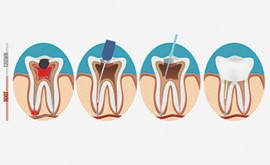You may have been told you need root canal therapy or treatment on your teeth but you might not be sure what this means.
Root canal therapy (also know as endodontics) is a sequence of treatment required when the blood or nerve supply of your tooth (called the ‘pulp’) is infected through decay or injury. It gets rid of the infected pulp, eliminating infection and protecting the tooth from future infection.
When the pulp becomes infected, the infection may spread and lead to a painful and inflamed abscess. The symptoms of an abscess can range from a dull ache to severe pain. The tooth may even be tender when you bite. If root canal treatment is not done, the infection will spread, the tooth may discolour and need to be taken out.
Root canal treatment is a skilled and time-consuming procedure. Our dentists can advise you on what is involved in your particular case. Most courses of treatment will involve two or more visits to the dentist.
To find out more, please read the guidance below. Alternatively contact us for advice.
No. Usually, a local anaesthetic is used and it should feel no different to having an ordinary filling done. There may be some tenderness afterwards but this should gradually get less over time. You will probably feel relief as, if you have previously been suffering from an abscess, that can be extremely uncomfortable!
Normally you will need at least two appointments.
In the first, the infected pulp is removed and any abscesses drained. The root canal is then cleaned and shaped ready for the filling. A temporary filling is put in and the tooth is left to settle.
In the second visit, the tooth is checked and, when all the infection has cleared, the tooth is permanently filled.
In the past, a root-filled tooth would often darken after treatment but with modern techniques this does not usually happen. If there is any discolouration, there are several treatments that you can have to restore the natural appearance.
The alternative is to have the tooth out. Once the pulp is destroyed it can't heal, and it is not recommended to leave an infected tooth in the mouth.
Although some people would prefer to have the tooth out, it is usually best to keep as many natural teeth as possible in order to help keep the remaining teeth stable and retain the natural line of the jaw.
Yes but because a 'dead' tooth is more brittle, you may be advised to have a crown to provide extra support and strength to the tooth.
Root-canal treated teeth need to be cared for in just the same way as your other teeth. Clean twice a day with a fluoride toothpaste, minimise consumption of sugary foods and drinks and have them only at mealtimes if possible, and have for regular dental check-ups.




